Unit 5 Education Lesson 2 The Objectives of Education课件(共39张,内嵌音频)北师大版(2019)选择性必修第二册(共40页ppt)
文档属性
| 名称 | Unit 5 Education Lesson 2 The Objectives of Education课件(共39张,内嵌音频)北师大版(2019)选择性必修第二册(共40页ppt) | 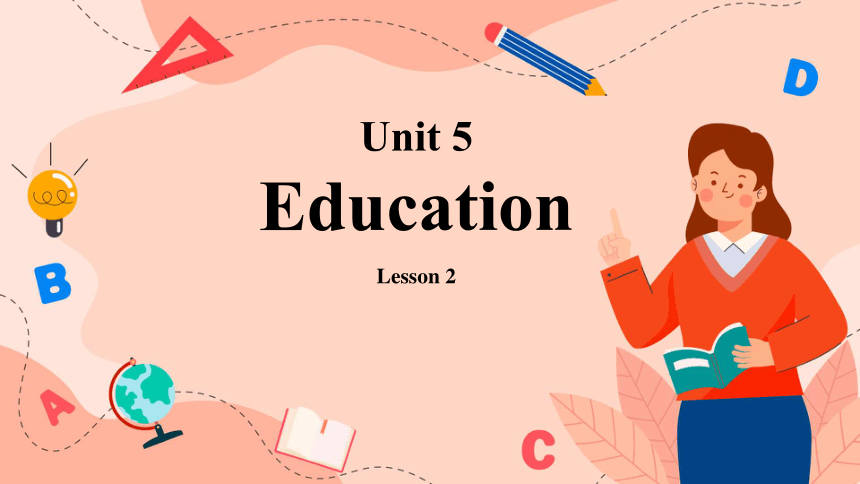 | |
| 格式 | pptx | ||
| 文件大小 | 39.4MB | ||
| 资源类型 | 教案 | ||
| 版本资源 | 北师大版(2019) | ||
| 科目 | 英语 | ||
| 更新时间 | 2025-08-01 11:09:22 | ||
图片预览

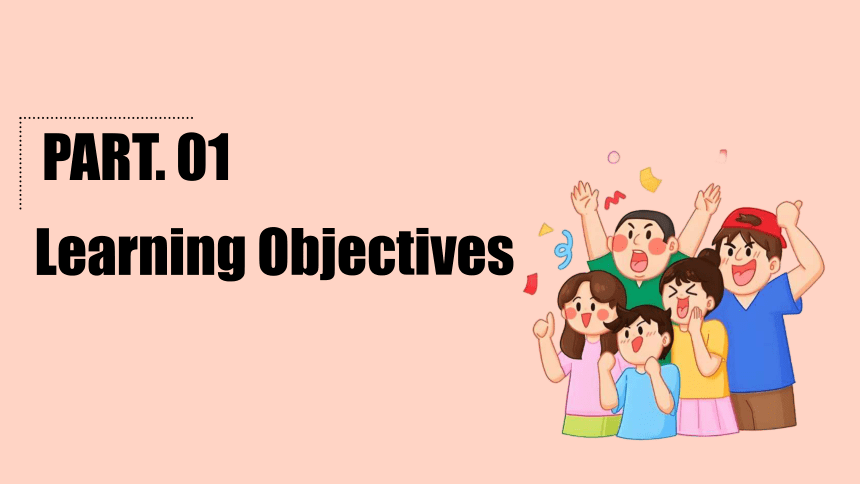
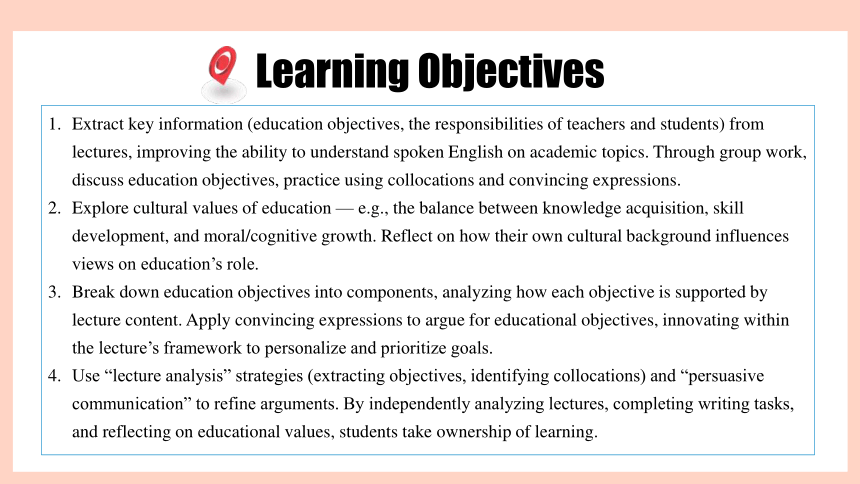
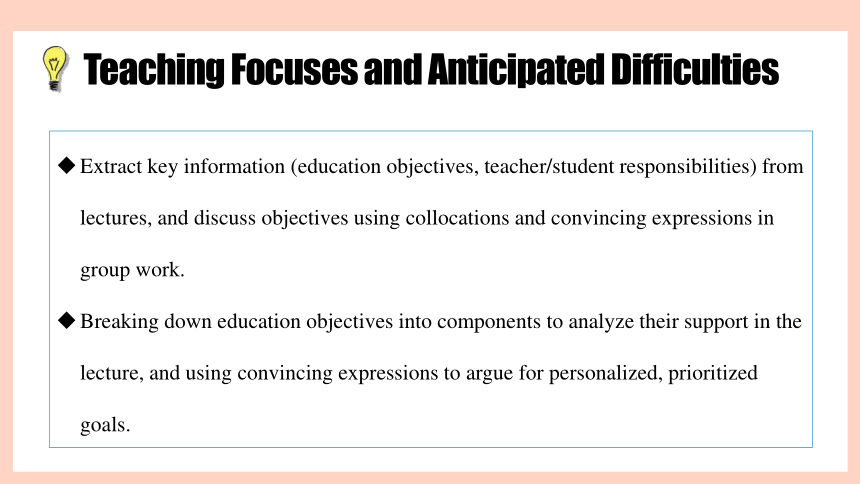
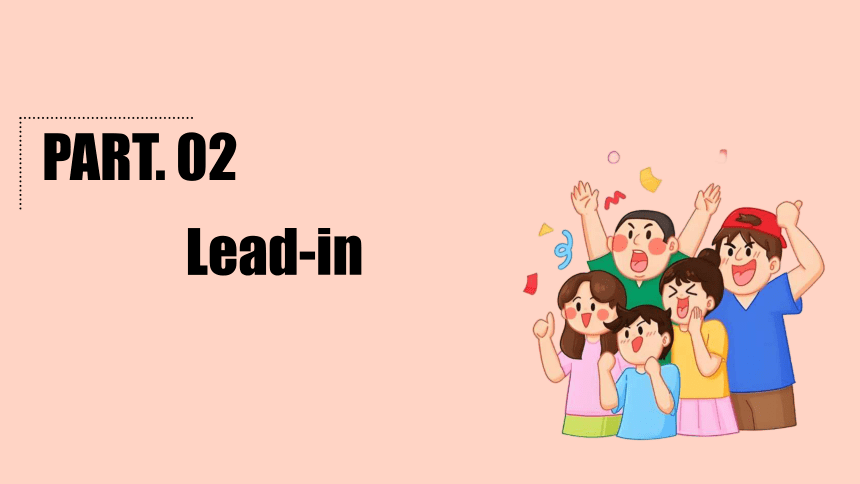
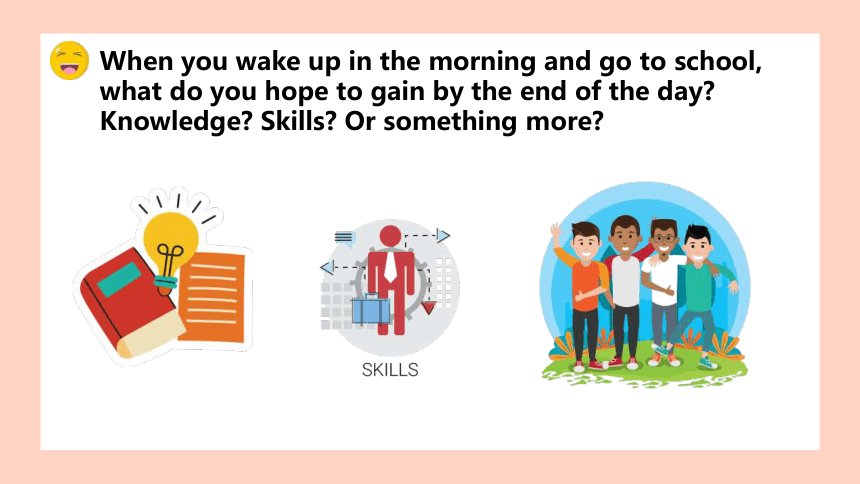
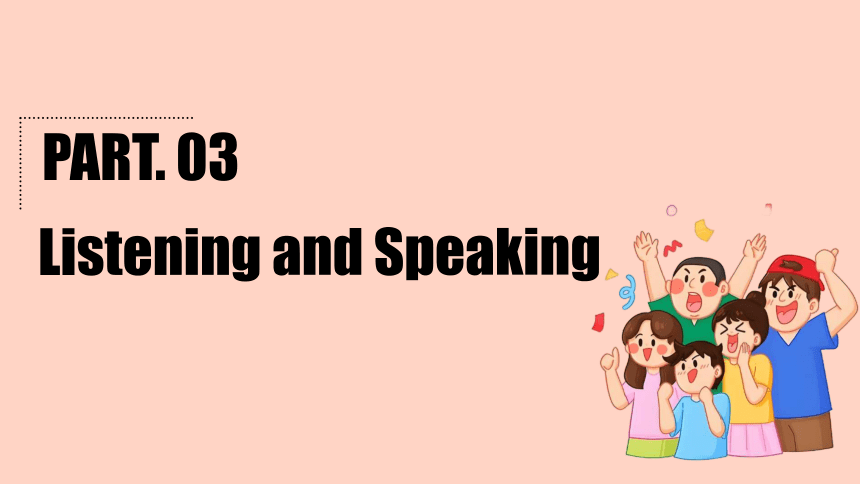
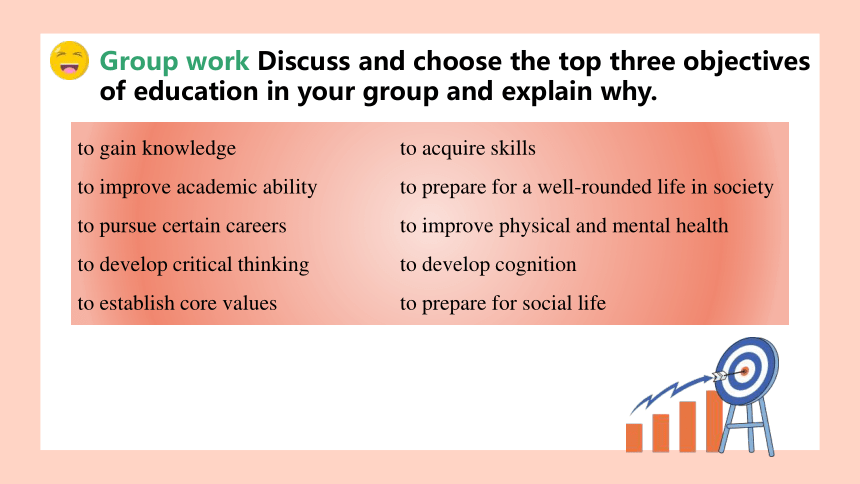
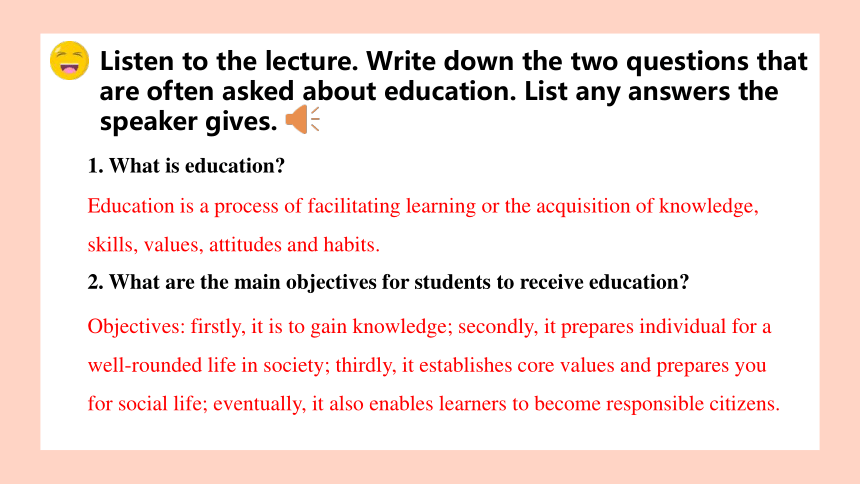
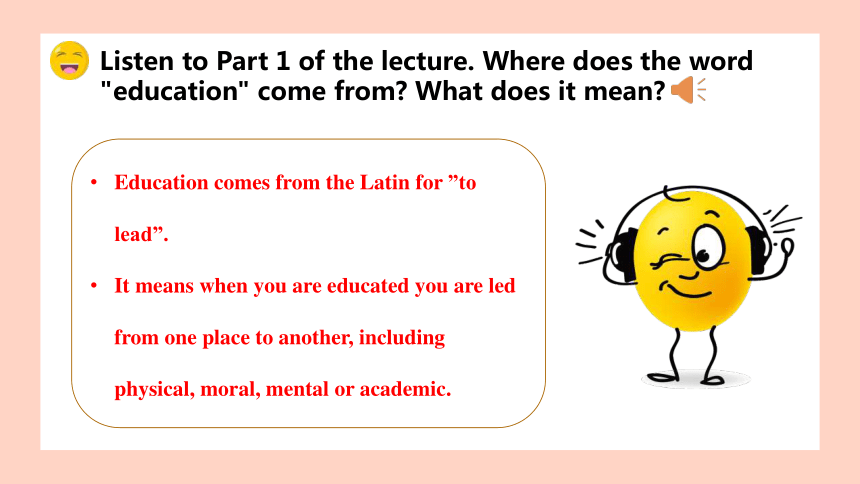
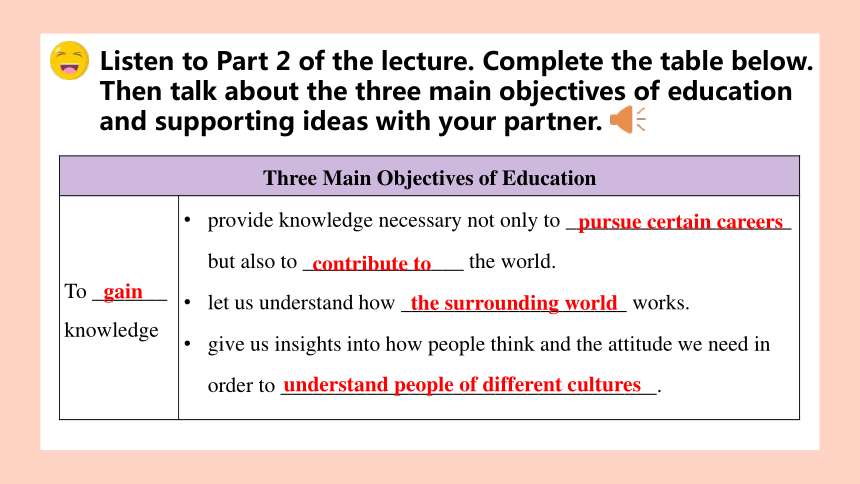
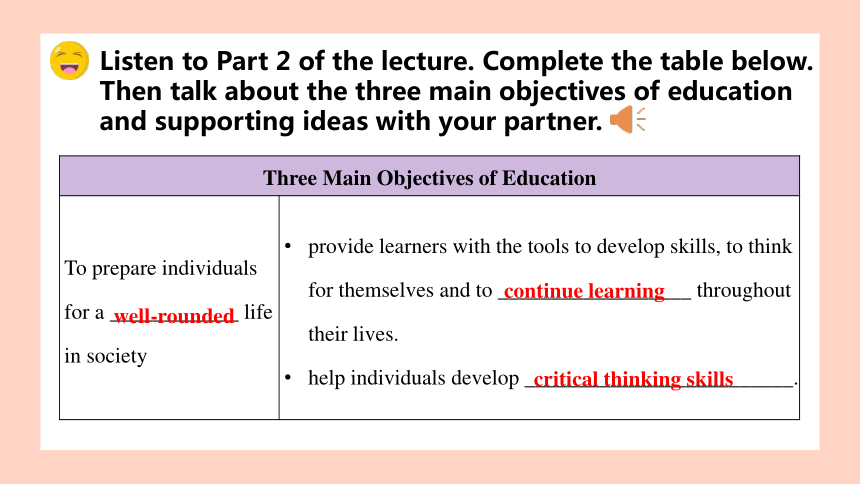
文档简介
(共39张PPT)
Unit 5
Education
Lesson 2
Learning Objectives
PART. 01
Understand the daily study and life of British middle school students by watching videos. Based on your own daily study and life, compare the study and life in Chinese and British schools, and find out the similarities and differences between the two. Talk about your first impression of high school life, and have a preliminary perception of the study and life in the senior high school stage.
Learning Objectives
Extract key information (education objectives, the responsibilities of teachers and students) from lectures, improving the ability to understand spoken English on academic topics. Through group work, discuss education objectives, practice using collocations and convincing expressions.
Explore cultural values of education — e.g., the balance between knowledge acquisition, skill development, and moral/cognitive growth. Reflect on how their own cultural background influences views on education’s role.
Break down education objectives into components, analyzing how each objective is supported by lecture content. Apply convincing expressions to argue for educational objectives, innovating within the lecture’s framework to personalize and prioritize goals.
Use “lecture analysis” strategies (extracting objectives, identifying collocations) and “persuasive communication” to refine arguments. By independently analyzing lectures, completing writing tasks, and reflecting on educational values, students take ownership of learning.
Understand the daily study and life of British middle school students by watching videos. Based on your own daily study and life, compare the study and life in Chinese and British schools, and find out the similarities and differences between the two. Talk about your first impression of high school life, and have a preliminary perception of the study and life in the senior high school stage.
Teaching Focuses and Anticipated Difficulties
Extract key information (education objectives, teacher/student responsibilities) from lectures, and discuss objectives using collocations and convincing expressions in group work.
Breaking down education objectives into components to analyze their support in the lecture, and using convincing expressions to argue for personalized, prioritized goals.
Lead-in
PART. 02
When you wake up in the morning and go to school, what do you hope to gain by the end of the day Knowledge Skills Or something more
Listening and Speaking
PART. 03
Group work Discuss and choose the top three objectives of education in your group and explain why.
to gain knowledge to acquire skills
to improve academic ability to prepare for a well-rounded life in society
to pursue certain careers to improve physical and mental health
to develop critical thinking to develop cognition
to establish core values to prepare for social life
Listen to the lecture. Write down the two questions that are often asked about education. List any answers the speaker gives.
1. What is education
2. What are the main objectives for students to receive education
Education is a process of facilitating learning or the acquisition of knowledge, skills, values, attitudes and habits.
Objectives: firstly, it is to gain knowledge; secondly, it prepares individual for a well-rounded life in society; thirdly, it establishes core values and prepares you for social life; eventually, it also enables learners to become responsible citizens.
Listen to Part 1 of the lecture. Where does the word "education" come from What does it mean
Education comes from the Latin for ”to lead”.
It means when you are educated you are led from one place to another, including physical, moral, mental or academic.
Listen to Part 2 of the plete the table below. Then talk about the three main objectives of education and supporting ideas with your partner.
Three Main Objectives of Education To _______ knowledge provide knowledge necessary not only to _____________________ but also to _______________ the world.
let us understand how _____________________ works.
give us insights into how people think and the attitude we need in order to ___________________________________.
gain
pursue certain careers
contribute to
the surrounding world
understand people of different cultures
Listen to Part 2 of the plete the table below. Then talk about the three main objectives of education and supporting ideas with your partner.
Three Main Objectives of Education To prepare individuals for a ____________ life in society provide learners with the tools to develop skills, to think for themselves and to __________________ throughout their lives.
help individuals develop _________________________.
well-rounded
continue learning
critical thinking skills
Listen to Part 2 of the plete the table below. Then talk about the three main objectives of education and supporting ideas with your partner.
Three Main Objectives of Education To ________ core values and prepare you for __________ help to understand what is wrong and __________________.
help to explore ___________and develop ____________.
help to learn how to _________ with other people in a civil manner.
make people _________ with integrity.
enable learners to establish __________________________, as well as form _______________.
establish
social life
what is right
the truth
cognition
interact
behave
the right values and attitudes
good habits
Good afternoon, everyone. In today’s lecture, we’ll be discussing education. The questions we often ask about education are: what is education And what are the main objectives for students to receive education
Well, what is education Education comes from the Latin for “to lead”. So, when you are educated you are led from one place to another, including physical, moral, mental or academic. It is a process of facilitating learning or the acquisition of knowledge, skills, values, attitudes and habits.
Let’s move on to talk about the objectives of education.
For me, education has three main objectives. Firstly, it is to gain knowledge. Obviously, certain kinds of knowledge are necessary not only to pursue certain careers but also to contribute to the world. For example, we need to learn maths to understand finance and economics; we need to be able to read, so that we are able to communicate and expose ourselves to new things. Besides, education provides another deeper kind of knowledge, which lets us understand how the surrounding world works. It gives us insights into how people think and the attitude we need in order to understand people of different cultures.
Transcript
Secondly, education goes beyond knowledge; it prepares individuals for a well-rounded life in society. In other words, it provides learners with the tools to develop skills, to think for themselves and to continue learning throughout their lives. For example, education can help individuals develop critical thinking skills, which will prevent them from following uncritically traditional ways and will enable them to act based on judgement.
Thirdly, education establishes core values and prepares you for social life. It helps you to understand what is wrong and what is right, explore the truth and develop cognition, regardless of whether it’s easy or what others’ opinions are; it also helps you learn how to interact with other people in a civil manner, regardless of nationality, race or class. It makes people behave with integrity, regardless of background and circumstances. Therefore, there will be more critical, kind, honest and truthful citizens in society. Eventually, education also enables learners to establish the right values and attitudes, as well as form good habits so that they can become responsible citizens as well.
In conclusion, education is important not only because it facilitates individual development, but also promotes social and national development. Referring back to the definition provided at the very beginning, education facilitates the development of an individual physically, mentally, morally and academically, so that the individual can make effective contributions to social development.
Any questions
Transcript
Match the expressions to make collocations. Then use the collocations to complete the sentences.
gain
expose
develop
establish
receive
give
cognition
core values
education
oneself to new things
insights into
knowledge
gain knowledge
expose oneself to new things
develop cognition
establish core values
receive education
give insights into
Match the expressions to make collocations. Then use the collocations to complete the sentences.
gain knowledge expose oneself to new things develop cognition
establish core values receive education give insights into
1. Everyone has the right to ___________________.
2. Don’t be afraid of _________________________________. We should always acquire new knowledge.
3. The article __________________ the purpose of education.
4. We ___________________ from reading to improve ourselves.
5. Senior Secondary is a critical period to _______________ and __________________.
receive education
exposing ourselves to new things
gives insights into
gain knowledge
develop cognition
establish core values
Listen to the Q & A session of the lecture. What question does the student ask What are Professor James' responses to the question
The student’s question: _________________________________________________
____________________________________________________________________
Teachers should:
facilitate ________________;
pass on _____________on and ________________;
stimulate students’ ___________________;
teach students to think __________ and __________;
provide rich ___________ and help students learn to use
______________________________________________.
In order to achieve the main objectives of education, what should teachers and students do respectively
students’ learning
knowledge
skills to students
interests in learning
critically
creatively
resources
the right strategies to make learning more effective
Listen to the Q & A session of the lecture. What question does the student ask What are Professor James' responses to the question
Students should:
become ________________learners;
have ____________________ for themselves;
learn how to __________, ______________ and ______________________;
make __________________ to guide one’s own beliefs and actions;
____________ what they have learnt.
autonomous
clear learning goals
analyse
compare
evaluate what is taught
proper judgements
demonstrate
S: Professor James, thank you very much for the very __________ talk. It makes me rethink the objectives of education. My question is: in order to achieve the main objectives of education, what should teachers and students do respectively
J: That is a very good question. Let’s first talk about teachers’ _____________. I think a teacher’s top _________ is to facilitate students’ learning. That means a teacher’s job is not just to pass on knowledge and skills to students, but it’s more important to stimulate students’ interests in learning and teach them to think critically and creatively. Also, a teacher needs to _________ students’ learning by providing rich resources and helping them learn to use the right strategies to make learning more effective.
Listen again and fill in the blanks with the words you hear.
insightful
responsibility
priority
support
S: Thank you. What about the students’ responsibility
J: Well, I believe it is the students’ responsibility to take the __________ to become autonomous learners. That’s why students need to have clear learning goals for themselves and to learn how to analyse, compare and evaluate what is taught. _________ thing that’s important for students is that they need to make proper judgements to guide their own beliefs and actions, and it’s a __________ idea to demonstrate what they have learnt when _________.
S: Thank you.
Listen again and fill in the blanks with the words you hear.
initiative
assessed
Another
brilliant
Listen and plete the Talk Builder.
Convincing
1. _______________________ stimulate students’ interests in learning.
2. _____________ students need to have clear learning goals for themselves.
3. ____________________________ for students is that they need to make proper judgements ...
4. _______________________ demonstrate what they have learnt.
Talk Builder
Another thing that’s important That’s why
It’s a brilliant idea to It’s more important to
It’s more important to
That’s why
Another thing that’s important
It’s a brilliant idea to
Group work Discuss the objectives of education in groups using convincing expressions.
Vocabulary
1. objective
object n. 物,物体;目的,目标 v. 反对,不赞成
object to sth/sb 反对某事/某人
object to (sb) doing sth 反对(某人)干某事
object that... 提出……作为反对的理由
objection n. 不赞成;异议;反对的理由
例题:
As a judge, he must make decisions based on facts to ensure the process is fair and __________(object).
objective
Vocabulary
2. contribute
contribute to sth/doing sth 促成某事;是……的原因之一
contribute… to… 向……捐献……
contribution n. 贡献;捐款
make a contribution to (doing) sth. 为(做)某事做贡献
例题:
Every citizen can make a contribution to _________(protect) the environment by reducing plastic waste in daily life.
protecting
Vocabulary
3. expose
expose… to… 把……暴露在……下
expose oneself 使自己面临/暴露于危险中
expose sb. to sth. 使接触;使体验
be exposed to 遭受到
exposure n. 暴露
例题:
Parents should expose children ______ different cultures from an early age to broaden their horizons.
to
Vocabulary
4. surrounding
surround v. 环绕;围绕;围住,包围
be surrounded by 被……环绕/包围
surround oneself with sb/sth 和某人/某物在一起;与某人/某物为伍
surroundings n. 环境;周围的事物
例题:
The small village is ___________(surround) by lush green mountains and clear streams, making it a peaceful retreat.
surrounded
Vocabulary
5. judgement
judge vt. 评判;判定
judge by... 根据……判断
judging from/by 由……来判断
judge...to be/as... 判断……为……;认为……是……
as far as I can judge 据我判断,依我看
例题:
Her quick __________(judge) in the emergency helped save the child from danger.
judgement
Vocabulary
6. conclusion
make a conclusion 下结论
in conclusion 最后;总之
come to/ lead to/ reach the conclusion 得出结论
conclude vt. & vi. 结束;推断出
conclude from 从……中得出
conclude by/with 以……结束
例题:
_____ conclusion, while technology brings convenience, we must also be cautious about its potential risks to privacy and social interaction.
In
Vocabulary
7. responsibility
sense of responsibility 责任感
responsibility to/towards sb 对某人的职责
have/take responsibility for 对……负责
responsible adj. 负有责任的;负责的
be responsible for 对……负责
例题:
As a team leader, she has responsibility ______ ensuring all members understand their tasks and meet the project deadline.
for
Vocabulary
8. assess
assess sth at... 估算/核定某物值……(钱)
assess... as... 评定……为……
assessment n. 评价;核定
例题:
Before starting the project, we need to conduct a thorough __________(assess) of the potential risks and costs.
assessment
Exercise
PART. 04
1. A leader with i_________(正直) will always keep their promises, even when it’s difficult to do so.
2. For students, balancing study and health should be a top p________(优先处理的事) during the exam period.
3. The robot is designed to be fully a___________(自主的), completing complex tasks like sorting materials and monitoring equipment on its own.
4. Under no c___________(情况) should you enter the construction site without wearing a safety helmet.
ntegrity
Exercise: 单词拼写
riority
utonomous
ircumstance
1. The student’s clear _____________(demonstrate) of solving the math problem helped the whole class understand the method.
2. The ___________(acquire) of basic language skills is essential for students learning a foreign language.
3. Tom and Jane won the first and second prizes in the speech contest, ____________ (respective).
4. There’s often debate about the __________(define) of art, as people have different ideas about what qualifies as creative expression.
demonstration
Exercise: 用所给词的适当形式填空
acquisition
respectively
definition
Summary
PART. 05
添加标题
ADD THE TITLE HERE
Lesson 2
Vocabulary
Extract key information (education objectives, the responsibilities of teachers and students) from lectures.
Discuss education objectives, practice using collocations and convincing expressions.
Listening
objective, contribute, expose, surrounding, judgement, conclusion, responsibility, assess
Homework
PART. 06
Write down your speech draft on “The objectives of learning”.
Homework
See you next class!
Unit 5
Education
Lesson 2
Learning Objectives
PART. 01
Understand the daily study and life of British middle school students by watching videos. Based on your own daily study and life, compare the study and life in Chinese and British schools, and find out the similarities and differences between the two. Talk about your first impression of high school life, and have a preliminary perception of the study and life in the senior high school stage.
Learning Objectives
Extract key information (education objectives, the responsibilities of teachers and students) from lectures, improving the ability to understand spoken English on academic topics. Through group work, discuss education objectives, practice using collocations and convincing expressions.
Explore cultural values of education — e.g., the balance between knowledge acquisition, skill development, and moral/cognitive growth. Reflect on how their own cultural background influences views on education’s role.
Break down education objectives into components, analyzing how each objective is supported by lecture content. Apply convincing expressions to argue for educational objectives, innovating within the lecture’s framework to personalize and prioritize goals.
Use “lecture analysis” strategies (extracting objectives, identifying collocations) and “persuasive communication” to refine arguments. By independently analyzing lectures, completing writing tasks, and reflecting on educational values, students take ownership of learning.
Understand the daily study and life of British middle school students by watching videos. Based on your own daily study and life, compare the study and life in Chinese and British schools, and find out the similarities and differences between the two. Talk about your first impression of high school life, and have a preliminary perception of the study and life in the senior high school stage.
Teaching Focuses and Anticipated Difficulties
Extract key information (education objectives, teacher/student responsibilities) from lectures, and discuss objectives using collocations and convincing expressions in group work.
Breaking down education objectives into components to analyze their support in the lecture, and using convincing expressions to argue for personalized, prioritized goals.
Lead-in
PART. 02
When you wake up in the morning and go to school, what do you hope to gain by the end of the day Knowledge Skills Or something more
Listening and Speaking
PART. 03
Group work Discuss and choose the top three objectives of education in your group and explain why.
to gain knowledge to acquire skills
to improve academic ability to prepare for a well-rounded life in society
to pursue certain careers to improve physical and mental health
to develop critical thinking to develop cognition
to establish core values to prepare for social life
Listen to the lecture. Write down the two questions that are often asked about education. List any answers the speaker gives.
1. What is education
2. What are the main objectives for students to receive education
Education is a process of facilitating learning or the acquisition of knowledge, skills, values, attitudes and habits.
Objectives: firstly, it is to gain knowledge; secondly, it prepares individual for a well-rounded life in society; thirdly, it establishes core values and prepares you for social life; eventually, it also enables learners to become responsible citizens.
Listen to Part 1 of the lecture. Where does the word "education" come from What does it mean
Education comes from the Latin for ”to lead”.
It means when you are educated you are led from one place to another, including physical, moral, mental or academic.
Listen to Part 2 of the plete the table below. Then talk about the three main objectives of education and supporting ideas with your partner.
Three Main Objectives of Education To _______ knowledge provide knowledge necessary not only to _____________________ but also to _______________ the world.
let us understand how _____________________ works.
give us insights into how people think and the attitude we need in order to ___________________________________.
gain
pursue certain careers
contribute to
the surrounding world
understand people of different cultures
Listen to Part 2 of the plete the table below. Then talk about the three main objectives of education and supporting ideas with your partner.
Three Main Objectives of Education To prepare individuals for a ____________ life in society provide learners with the tools to develop skills, to think for themselves and to __________________ throughout their lives.
help individuals develop _________________________.
well-rounded
continue learning
critical thinking skills
Listen to Part 2 of the plete the table below. Then talk about the three main objectives of education and supporting ideas with your partner.
Three Main Objectives of Education To ________ core values and prepare you for __________ help to understand what is wrong and __________________.
help to explore ___________and develop ____________.
help to learn how to _________ with other people in a civil manner.
make people _________ with integrity.
enable learners to establish __________________________, as well as form _______________.
establish
social life
what is right
the truth
cognition
interact
behave
the right values and attitudes
good habits
Good afternoon, everyone. In today’s lecture, we’ll be discussing education. The questions we often ask about education are: what is education And what are the main objectives for students to receive education
Well, what is education Education comes from the Latin for “to lead”. So, when you are educated you are led from one place to another, including physical, moral, mental or academic. It is a process of facilitating learning or the acquisition of knowledge, skills, values, attitudes and habits.
Let’s move on to talk about the objectives of education.
For me, education has three main objectives. Firstly, it is to gain knowledge. Obviously, certain kinds of knowledge are necessary not only to pursue certain careers but also to contribute to the world. For example, we need to learn maths to understand finance and economics; we need to be able to read, so that we are able to communicate and expose ourselves to new things. Besides, education provides another deeper kind of knowledge, which lets us understand how the surrounding world works. It gives us insights into how people think and the attitude we need in order to understand people of different cultures.
Transcript
Secondly, education goes beyond knowledge; it prepares individuals for a well-rounded life in society. In other words, it provides learners with the tools to develop skills, to think for themselves and to continue learning throughout their lives. For example, education can help individuals develop critical thinking skills, which will prevent them from following uncritically traditional ways and will enable them to act based on judgement.
Thirdly, education establishes core values and prepares you for social life. It helps you to understand what is wrong and what is right, explore the truth and develop cognition, regardless of whether it’s easy or what others’ opinions are; it also helps you learn how to interact with other people in a civil manner, regardless of nationality, race or class. It makes people behave with integrity, regardless of background and circumstances. Therefore, there will be more critical, kind, honest and truthful citizens in society. Eventually, education also enables learners to establish the right values and attitudes, as well as form good habits so that they can become responsible citizens as well.
In conclusion, education is important not only because it facilitates individual development, but also promotes social and national development. Referring back to the definition provided at the very beginning, education facilitates the development of an individual physically, mentally, morally and academically, so that the individual can make effective contributions to social development.
Any questions
Transcript
Match the expressions to make collocations. Then use the collocations to complete the sentences.
gain
expose
develop
establish
receive
give
cognition
core values
education
oneself to new things
insights into
knowledge
gain knowledge
expose oneself to new things
develop cognition
establish core values
receive education
give insights into
Match the expressions to make collocations. Then use the collocations to complete the sentences.
gain knowledge expose oneself to new things develop cognition
establish core values receive education give insights into
1. Everyone has the right to ___________________.
2. Don’t be afraid of _________________________________. We should always acquire new knowledge.
3. The article __________________ the purpose of education.
4. We ___________________ from reading to improve ourselves.
5. Senior Secondary is a critical period to _______________ and __________________.
receive education
exposing ourselves to new things
gives insights into
gain knowledge
develop cognition
establish core values
Listen to the Q & A session of the lecture. What question does the student ask What are Professor James' responses to the question
The student’s question: _________________________________________________
____________________________________________________________________
Teachers should:
facilitate ________________;
pass on _____________on and ________________;
stimulate students’ ___________________;
teach students to think __________ and __________;
provide rich ___________ and help students learn to use
______________________________________________.
In order to achieve the main objectives of education, what should teachers and students do respectively
students’ learning
knowledge
skills to students
interests in learning
critically
creatively
resources
the right strategies to make learning more effective
Listen to the Q & A session of the lecture. What question does the student ask What are Professor James' responses to the question
Students should:
become ________________learners;
have ____________________ for themselves;
learn how to __________, ______________ and ______________________;
make __________________ to guide one’s own beliefs and actions;
____________ what they have learnt.
autonomous
clear learning goals
analyse
compare
evaluate what is taught
proper judgements
demonstrate
S: Professor James, thank you very much for the very __________ talk. It makes me rethink the objectives of education. My question is: in order to achieve the main objectives of education, what should teachers and students do respectively
J: That is a very good question. Let’s first talk about teachers’ _____________. I think a teacher’s top _________ is to facilitate students’ learning. That means a teacher’s job is not just to pass on knowledge and skills to students, but it’s more important to stimulate students’ interests in learning and teach them to think critically and creatively. Also, a teacher needs to _________ students’ learning by providing rich resources and helping them learn to use the right strategies to make learning more effective.
Listen again and fill in the blanks with the words you hear.
insightful
responsibility
priority
support
S: Thank you. What about the students’ responsibility
J: Well, I believe it is the students’ responsibility to take the __________ to become autonomous learners. That’s why students need to have clear learning goals for themselves and to learn how to analyse, compare and evaluate what is taught. _________ thing that’s important for students is that they need to make proper judgements to guide their own beliefs and actions, and it’s a __________ idea to demonstrate what they have learnt when _________.
S: Thank you.
Listen again and fill in the blanks with the words you hear.
initiative
assessed
Another
brilliant
Listen and plete the Talk Builder.
Convincing
1. _______________________ stimulate students’ interests in learning.
2. _____________ students need to have clear learning goals for themselves.
3. ____________________________ for students is that they need to make proper judgements ...
4. _______________________ demonstrate what they have learnt.
Talk Builder
Another thing that’s important That’s why
It’s a brilliant idea to It’s more important to
It’s more important to
That’s why
Another thing that’s important
It’s a brilliant idea to
Group work Discuss the objectives of education in groups using convincing expressions.
Vocabulary
1. objective
object n. 物,物体;目的,目标 v. 反对,不赞成
object to sth/sb 反对某事/某人
object to (sb) doing sth 反对(某人)干某事
object that... 提出……作为反对的理由
objection n. 不赞成;异议;反对的理由
例题:
As a judge, he must make decisions based on facts to ensure the process is fair and __________(object).
objective
Vocabulary
2. contribute
contribute to sth/doing sth 促成某事;是……的原因之一
contribute… to… 向……捐献……
contribution n. 贡献;捐款
make a contribution to (doing) sth. 为(做)某事做贡献
例题:
Every citizen can make a contribution to _________(protect) the environment by reducing plastic waste in daily life.
protecting
Vocabulary
3. expose
expose… to… 把……暴露在……下
expose oneself 使自己面临/暴露于危险中
expose sb. to sth. 使接触;使体验
be exposed to 遭受到
exposure n. 暴露
例题:
Parents should expose children ______ different cultures from an early age to broaden their horizons.
to
Vocabulary
4. surrounding
surround v. 环绕;围绕;围住,包围
be surrounded by 被……环绕/包围
surround oneself with sb/sth 和某人/某物在一起;与某人/某物为伍
surroundings n. 环境;周围的事物
例题:
The small village is ___________(surround) by lush green mountains and clear streams, making it a peaceful retreat.
surrounded
Vocabulary
5. judgement
judge vt. 评判;判定
judge by... 根据……判断
judging from/by 由……来判断
judge...to be/as... 判断……为……;认为……是……
as far as I can judge 据我判断,依我看
例题:
Her quick __________(judge) in the emergency helped save the child from danger.
judgement
Vocabulary
6. conclusion
make a conclusion 下结论
in conclusion 最后;总之
come to/ lead to/ reach the conclusion 得出结论
conclude vt. & vi. 结束;推断出
conclude from 从……中得出
conclude by/with 以……结束
例题:
_____ conclusion, while technology brings convenience, we must also be cautious about its potential risks to privacy and social interaction.
In
Vocabulary
7. responsibility
sense of responsibility 责任感
responsibility to/towards sb 对某人的职责
have/take responsibility for 对……负责
responsible adj. 负有责任的;负责的
be responsible for 对……负责
例题:
As a team leader, she has responsibility ______ ensuring all members understand their tasks and meet the project deadline.
for
Vocabulary
8. assess
assess sth at... 估算/核定某物值……(钱)
assess... as... 评定……为……
assessment n. 评价;核定
例题:
Before starting the project, we need to conduct a thorough __________(assess) of the potential risks and costs.
assessment
Exercise
PART. 04
1. A leader with i_________(正直) will always keep their promises, even when it’s difficult to do so.
2. For students, balancing study and health should be a top p________(优先处理的事) during the exam period.
3. The robot is designed to be fully a___________(自主的), completing complex tasks like sorting materials and monitoring equipment on its own.
4. Under no c___________(情况) should you enter the construction site without wearing a safety helmet.
ntegrity
Exercise: 单词拼写
riority
utonomous
ircumstance
1. The student’s clear _____________(demonstrate) of solving the math problem helped the whole class understand the method.
2. The ___________(acquire) of basic language skills is essential for students learning a foreign language.
3. Tom and Jane won the first and second prizes in the speech contest, ____________ (respective).
4. There’s often debate about the __________(define) of art, as people have different ideas about what qualifies as creative expression.
demonstration
Exercise: 用所给词的适当形式填空
acquisition
respectively
definition
Summary
PART. 05
添加标题
ADD THE TITLE HERE
Lesson 2
Vocabulary
Extract key information (education objectives, the responsibilities of teachers and students) from lectures.
Discuss education objectives, practice using collocations and convincing expressions.
Listening
objective, contribute, expose, surrounding, judgement, conclusion, responsibility, assess
Homework
PART. 06
Write down your speech draft on “The objectives of learning”.
Homework
See you next class!
同课章节目录
- Unit 4 Humour
- Lesson 1 What’s So Funny?
- Lesson 2 Why Do We Need Humour?
- Lesson 3 My Favourite Comedian
- Unit 5 Education
- Lesson 1 Enlightening a Mind
- Lesson 2 The Objectives of Education
- Lesson 3 Understanding
- Unit 6 The Media
- Lesson 1 From Page to Screen
- Lesson 2 Questions about Media
- Lesson 3 The Advertising Game
